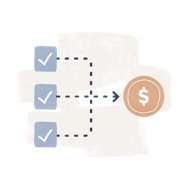For most business owners, when they take up a business loan, they think about how the loan is going to take their business to the next level. The last thing on their mind is what would happen if they were to default on the loan. But it’s actually very important to understand what “Personal Guarantee” and “Collateral” really mean if bad fortune catches up with you and how to deal with the repercussions.
Personal Guarantee
Let’s start with personal guarantee. First, if you are a sole proprietor, you and your business are the same entity. When you take up a business loan, you personally guarantee the loan by default. But if you take up a business loan for a corporation like an LLC, S-Corp or C-Corp, you are not personally responsible for it unless you personally guarantee it (read here about why lenders and vendors want personal guarantees).
What personal guarantee really means is that if your business doesn’t or can’t make the loan payment, you will be personally responsible for it. If you are late on the payments for a considerable period of time, the delinquency will show up on your personal credit report and your credit score will be negatively impacted.
In addition, the lenders can go after your personal assets to get repaid. If your owed amount is equal to or less than the limits of the small claims court, the lender can take you to small claims court and the court most likely will order you to pay the lender back since you personally guaranteed the business loan. It’s a pretty painless process for lenders to take you to small claims court so most likely they would do it. Once the lender gets the court order, they can proceed to freeze your bank account and more. At that point, it’s best to negotiate a payment plan with your lender.
If your owed amount is more than the small claims court limit (over $10K in California for example), it will take the lender a lot more effort, cost ($15K+) and time (6-9 months) to go to court and get an order that forces you to pay them. The lender will check your credit reports and do an asset search under your name to estimate your repayment ability. If the lender concludes that you don’t have the means to pay, the lender most likely will just write the loan off (if the loan is small and unsecured). The cost of collecting the repayment is simply too high for them to be worth it. In other words, if you were delinquent on a $15K unsecured loan because of a difficult financial situation, the lender will most likely just write it off and move on. But if you have the money but just don’t feel like paying, lenders will use all available tools to figure out how to make you pay them back. Most likely they will still sue you and ask you to pay their legal fees. The key takeaway: be honest and make your best effort to pay your creditors back. After all, you owe them money.
Most lenders require personal guarantees. Some of the MCA and daily debit ACH loan providers claim that they don’t require a personal guarantee. It doesn’t mean you don’t have to pay them back. Usually what it means is that you don’t have to pay them back if the business truly goes under. But if the business is alive and well, the loan/advance agreement needs to be honored between the lender and your business and as the owner of the business, you are responsible for making the payments on-time. There are certainly loopholes people can exploit but we believe integrity is the best policy. When you take up a loan, we recommend you make the best effort possible to repay it.
Collateral
Technically, collateral means the lender can put a lien on a piece of asset you pledge when you take up a business loan. But different kinds of collateral mean very different things during the collection process. A blanket lien on your business assets means the lenders can go after your business assets if the loan becomes delinquent. The lender has to go through a similar process as mentioned in the previous section. If it’s a small amount, they will go through the small claims court. Otherwise, they have to go through the regular courts. What this usually means is that this blanket business asset collateral is not really enforceable unless the amount at stake is really large or the lender figures out you have the means to pay but are gaming the system.
However, if you pledge a car or a house, the collection process is a lot more straightforward. The lender doesn’t have to go through the 6-9 month, $15K+ process to seize these types of assets. They can foreclose your house or repossess your car seamlessly since they put the lien on the house/car title directly. Banks certainly like these kinds of collateral. When you do pledge this kind of collateral, you have to think of the consequences. Some business owners decide not to use their vehicle as collateral to get a lower interest loan. They would rather pay a higher rate unsecured loan to keep their options open because, if they lose their vehicle, they won’t be able to generate any revenue for their business. These are truly tough decisions.
In addition, if you have a loan from a bank, they will ask for all your bank/CD accounts as collateral. If you default on them, it’s a pretty automatic process for them to take over your bank accounts. I know a business owner that had two businesses with Wells Fargo, defaulted on a line of credit with one of his businesses, and the bank seized money out of his other business’s checking account. They thought it would be illegal, but their legal representation told them it wasn’t. It was a huge fiasco for them.
To be a bit more precise, if your collateral involves a UCC filing instead of a lien on a house/car title, it will be very hard for lenders to enforce it. Although technically they can legally repossess your pledged collateral, they are constrained by the Breach of Peace Law to take the collateral from your private property. They have to go through the court process to get repaid, which is very expensive and time-consuming.
But lenders/collectors are also creative and ubiquitous. They will keep calling you and they will tell your clients, neighbors, family and friends that they have something important to discuss with you (lenders can’t legally disclose to them that you owe them money). Eventually, they might go to court and get the order to seize the collateral. Again, making the best effort to repay your loan is the best policy to deal with any delinquencies.
Writing this article makes me a bit depressed . It’s not the most pleasant stuff to write about but we believe it’s important information for business owners to understand. When you consider different loan options, be sure to take into account the possibility of default and how you would handle it.
This article was originally written on November 6, 2014 and updated on October 31, 2016.


ripped off by invent help and universal payment corp. do not have enough to continue paying. living off of social security and 68 dumb years old. can they write this off and move on to the next sucker and leave me alone. I have not missed payment yet, but after finding out they are being sued by the oxman law groupe I want to quit.
Are there any protections afforded to the borrower as there are for consumer loans?
Is the lender obligated to validate the debt, etc…?
No, the federal Fair Debt Collection Practices Act does not apply to small business loans.